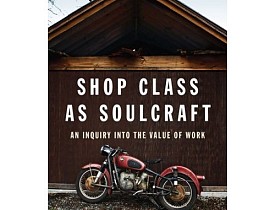Books: Shop Class as Soul Craft

I've talked about Shop Class as Soul Craft more than anything else I've read recently, because Matthew Crawford's words resonated with my personal experience. This book made me want to go out and build things, and it made me proud to have learned a trade. I was a National Honor Society student in high school, a Deans List Honors College student in university, supposedly well prepared for the job market. When I graduated from college, I found that my "knowledge worker" internships and my academic honors meant nothing, and that essentially I was an unskilled worker with educational loans to pay off. It wasn't until I learned a trade - proofreading - that I had access to decent work. I went to work as an apprentice in a print shop, where I learned from expert tradesmen. All of the essays I wrote on postmodernism didn't hold a candle in the job market to knowing how to use a type gage and having an eye trained to dissect errors on the printed page.
Shop Class as Soul Craft is a keen examination of the drawbacks of the American education system, and a tribute to the intelligence and integrity of skilled workers. Matthew Crawford has the analytical advantage of being a philosopher, an electrician, and a motorcycle mechanic. He reflects on the relative merits of the "knowledge-based" work he did (which was generally abysmal), and the relative freedoms of the manual labor he has done (his love for mechanical work is unparalleled). His philosophy is so cogent because he bases it in his life experience, an experience that many, if not all of us, can relate to.
The section of Shop Class as Soul Craft that hit me hardest was the chapter called "The Contradictions of the Cubicle," in which Crawford describes the abstract speech of managers, and the mind-numbing quality of white-collar cubicle work. I understood what he meant - never did I experience such dysphoria and longing for the material world as my first "real job" out of college, where my managers performed a bizarre daily ballet of vague directions and monitoring of my "professionalism" and "attitude," but rarely supervised or mentored the production of the product. In fact, they did not know how to produce the product. He says of his white collar job, "So the job required both dumbing down and a bit of moral education." This Crawford contrasts with working as an electrician, where "Your hands are sliced up from twisting wires together, handling junction boxes made out of stamped sheet metal, and cutting metal conduit with a hack saw. But none of this damage touches the best part of yourself." Crawford points at the lack of accountability to a real product that makes white collar managers become "therapists," or managers of personalities rather than mentors who evaluate the quality of a worker's product.
The fact the 90% of my high school class was pushed into college attests to the American attitude toward knowledge labor. Most of my class was not thirsty for the liberal arts. We were pushed into college because college promised "a good job." In reality, most of my peers have ended up working lower-level white collar jobs with little room for actual growth. Crawford suggests that learning a trade, in addition to college, is the best path for a matriculating student. He suggests that students learn actual trades, like plumbing and auto mechanics, during their summer breaks so that they might obtain decent wages and control over their working conditions after graduation. The author notes that trade schools and community colleges that offer training in manual trades are full of college graduates who are looking for an entry into real, fulfilling work.
The tastiest parts of Shop Class as Soulcraft are the passages where Matthew Crawford describes the satisfaction of fixing motorcycles, the profession that he chose in the end. He proves beyond any doubt that mechanics possess intuition and knowledge similar to doctors. When one savors these passages, there is no way to avoid wishing that he had chosen such a path - a path of self-reliance and competency that only the truly skilled enjoy.
Looking for a Pro? Call us (866) 441-6648

Electrical Average Costs
Electricians Experiences

New Roof Brings Out The Charm Of A 100-Year-Old House

New Low-Maintenance Landscaping To Update Our Yard



